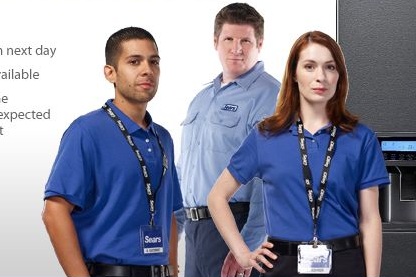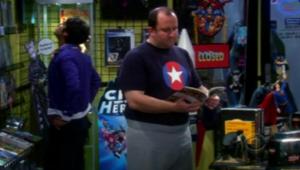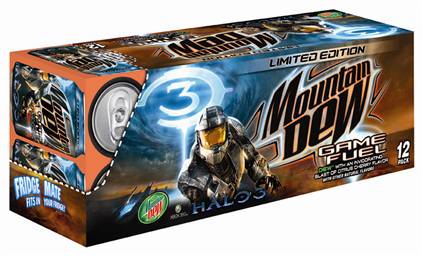Lately Sears has been using a series of TV ads called “The Sears Blue Crew” in which a band of zany actors dress as Sears salespersons in light-hearted commercials. One of those whacky actresses was nerd diva Felicia Day from The Guild. The odd thing about this ad was that Felicia was playing the role of “Sears Salesgirl” selling washing machines. She wasn’t “Celebrity Felicia Day” saying “Hello, I’m Felicia Day from the popular web series The Guild. I buy all my graphics cards from Sears.”
 Celebrity endorsement is ubiquitous with soft drinks, sneakers, and cosmetics. The logic being “If I wear the same shoes as Michael Jordan, I can jump high” or “If I use the same make-up as Jessica Alba I’ll be as pretty as her”. You should already know for yourself if you like Coke more than Pepsi, regardless of which cola is endorsed by which celebrity, and we all know that Michael Phelps is a good swimmer because of years of training, not a diet of Subway sandwiches. Yet the celebrity endorsement is a staple of advertising. Except in video game advertising.
Celebrity endorsement is ubiquitous with soft drinks, sneakers, and cosmetics. The logic being “If I wear the same shoes as Michael Jordan, I can jump high” or “If I use the same make-up as Jessica Alba I’ll be as pretty as her”. You should already know for yourself if you like Coke more than Pepsi, regardless of which cola is endorsed by which celebrity, and we all know that Michael Phelps is a good swimmer because of years of training, not a diet of Subway sandwiches. Yet the celebrity endorsement is a staple of advertising. Except in video game advertising.
In an odd example of this being used overseas, Nicole Kidman was hired to endorse the Nintendo DS, but that ad campaign never made it to America. The closest thing to this in America were the Mr. T and William Shatner ads for World of Warcraft, but these were sardonic; almost parodies of celebrity endorsements.

Ms. Kidman and a lucky stylus
There have been a very small number of cases where professional gamers were hired to hawk products, but these were limited to very niche markets; anyone remember Fatal1ty? Anyone actually own one of his gaming headsets?
Over the years there have been numerous attempts to use famous people to sell games or gaming related merchandise, but without using direct endorsements. For example, casting a reputable actor in a game implies endorsement; Liam Neeson plays a role in Fallout 3, but he isn’t claiming to have played the game. Shaun White is a character in his own game, but does he recommend other games made by Ubisoft? Another route for this is “If you play Mass Effect 2 you can have virtual sex with a character based on Yvonne Strahovsky”. Unfortunately, Yvonne probably doesn’t actually play Mass Effect (And will definitely not have sex with you because you bought her game).
 As close as you will get to Ms. Strahovsky
As close as you will get to Ms. Strahovsky
Games do get Product Placement in movies and TV shows; a great example of which is The Big Bang Theory. The show is about two stereotypical nerds whose apartment is filled with video game merchandise. Their neighborhood comic book store is also loaded with products from the game City of Heroes along with other products by NC Soft, the game’s publisher. The stars of the show, Jim Parsons and Johnny Galecki are fine actors, who might play games, but NC Soft doesn’t feature them in ads for Aion.

Companies have also tried to use fictional video game characters to sell products; Mountain Dew had generic Orcs and Elves from Warcraft sell a beverage called Game Fuel, but this is still a far cry from “Hi, I’m Ben Shultz, creator of Leeroy Jenkins; I always eat my chicken with Game Fuel”. Perhaps if Mountain Dew wrote “Nuka Cola” (From Fallout) on a bottle and slapped a picture of Vaultboy on the label gamers would be more likely to buy that than a regular bottle of Dew.

A logical choice for endorsers would be the folks who make the games. There are a handful of celebrity designers like Hideo Kijima (Metal Gear), Ken Levine (Bioshock), Sid Meier (Civilization) whose names are known to gamers. If Ken Levine told consumers exactly what sort mouse liked use when playing Bioshock, it might influence people. Albeit a small number of people.
I would like to think that advertisers consider us gamers too savvy for traditional advertising but, honestly, we get suckered in by the same sort of tricks that sell other products. The reason we don’t see a lot of celebrity endorsement for games is authenticity.
Models, movie stars, and Olymmpic athletes are too busy making movies and training for the Olympics to sink 100 hours into Final Fantasy. Any endorsement would sound false coming from someone who obviously doesn’t use that kind of product. However, gamers might be persuaded by the gaming industry’s own brand of celebrities. Gabe and Tycho from Penny Arcade aren’t spokesmodels, but get them to sincerely say they like a particular game (Or soda, or shoe) and you have a sales boost. Is it that ad agencies are unaware of the few trustworthy nerd Icons, or maybe it’s that they understand the second we suspect that Wil Wheaton is paid to endorse Guitar Hero, the authenticity is out the window.